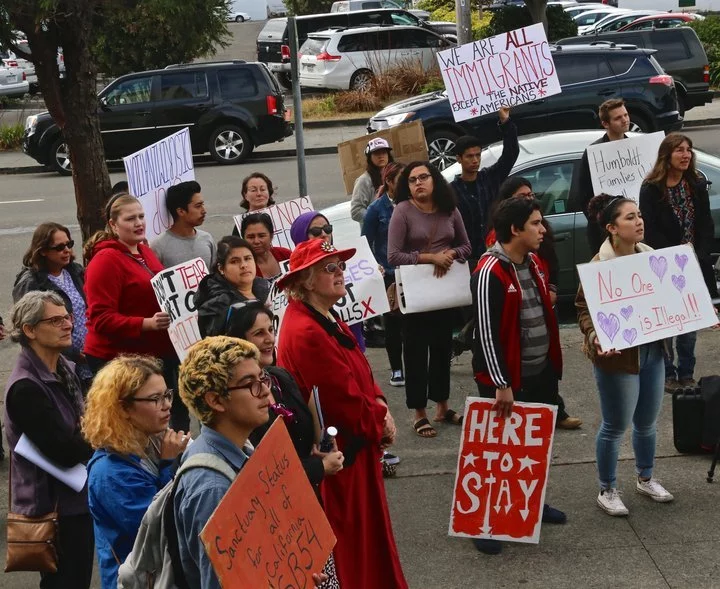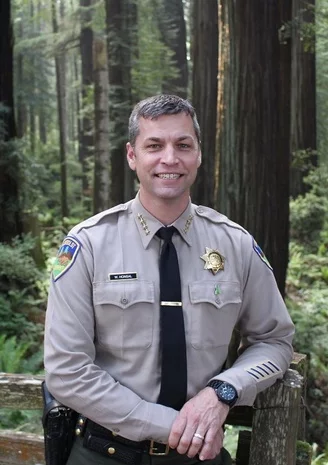Demonstrators rallied outside the Humboldt County Courthouse in September 2018 in defense of immigrants’ rights. | Photo: Andrew Goff
###
###
In its latest effort to ramp up deportation arrests in California, the U.S. Department of Justice (DOJ) sent letters to multiple county sheriffs on Thursday requesting the names of inmates in state and county jails who are not U.S. citizens, along with information on the crimes they committed and their scheduled release dates. If sheriffs do not comply within 30 days, U.S. Attorney General Pam Bondi said, the federal government will “pursue all available means of obtaining the data.”
Humboldt County Sheriff William Honsal told the Outpost in an interview this morning that his office wasn’t included in Bondi’s mailing list, noting that the request appears to be directed at major California counties.
“In communicating with other sheriffs around the state, it looks like Los Angeles, Riverside, San Diego and San Francisco [counties] were served with these letters,” Honsal said, adding that one of the sheriffs sent him a copy of the letter, which can be read in full here. “I have not been served with a letter, and I don’t think we will be [because] we don’t get a whole lot of people in our custody that [were] previously contacted by immigration [authorities] as many of those other counties do.”
While Bondi’s letter threatens “subpoenas or other compulsory process” for sheriffs who refuse to comply with the DOJ’s request, Honsal dismissed it as “posturing” and criticized the federal government for using law enforcement officials as “pawns” in a political game.
“This is posturing, is what this is,” he said. “Most sheriffs are nonpartisan, and we don’t adhere to politics or someone’s view or interpretation — the law is the law. … And this letter was produced in the news media first. A phone call should have been made by the Attorney General or someone from the DOJ to each of these sheriffs individually to let them know that they’re going to receive a letter. … We just believe we’re being played [as] pawns in this whole thing.”
In the months following President Donald J. Trump’s return to office, Honsal and Humboldt County District Attorney Stacey Eads have vowed to uphold local and state sanctuary policies that prohibit local enforcement agencies from asking someone about their immigration status or sharing personal information with U.S. Immigration and Customs Enforcement (ICE). However, there are exceptions for certain offenders.
“The law allows us, if [immigration authorities] call, to coordinate the release of someone who is in the country illegally, who’s been previously convicted of a serious or violent felony,” Honsal explained. “Also, if there’s a federal immigration warrant that’s signed by a judge. Those are [instances] where we can help out and facilitate a release to the U.S. Marshals or ICE.”
In years past, HCSO’s interactions with ICE have been triggered by a fresh arrest. When a person is booked and fingerprinted at the local jail, their information is transmitted to federal law enforcement and immigration authorities. If the person in custody is wanted for an immigration violation, the feds will ask for them to be held on a detainer.
The sheriff’s office “will not hold an individual beyond their release time,” Honsal said, but if immigration authorities arrive before they’re let go, they could be taken into custody.
“[ICE] will get the same notice we do and say, ‘Hey, Humboldt County just got John Smith, who’s in the country illegally, in their jail’ and they have the opportunity to call us up and say, ‘Hey, is John Smith still in your jail? What’s his release date?’” he continued. “We will provide them with that information — just like we would provide anyone with that information, because it’s public information — and if they happen to be here at the moment of their release, they can take them into custody. That has happened, but we do not facilitate it.”
Honsal reiterated several times during our conversation that the information sought by the DOJ is already publicly accessible.
“Everything they’re asking for is public; they don’t have to grandstand for it,” he continued. “We’re just tired of being in the middle of this. … If people want to change the law, the federal government has the opportunity to change immigration law. But in the meantime, we’re just caught in the middle here.”
While federal immigration raids are currently focused in Southern California, Honsal said it’s only a matter of time until ICE starts working its way up north. In the meantime, he emphasized that the sheriff’s office will not ask people for their immigration status and encouraged residents to contact law enforcement if they need help.
“I just want to assure everyone that [ICE] is a separate entity,” he said. “[Immigration] is the federal government’s responsibility, not [the] local sheriff’s, not local law enforcement. We’re just enforcing the law and keeping the peace — that’s our goal.”


CLICK TO MANAGE